Newsletter 2020/4
December 2020
Introduction
It is with great pleasure that I can introduce the fourth ITLOS newsletter for 2020, the first under my Presidency of the Tribunal.
In light of the COVID-19 pandemic, the last couple of months have certainly been challenging for everyone and the Tribunal is not alone in seeking innovative ways to adapt its working methods to the new circumstances. At its Fiftieth Session, in September 2020, the Tribunal amended its Rules to allow, as an exceptional measure, for hearings and meetings to be held entirely or in part by video link, thereby following global trends. However, for an international court or tribunal, the organization of a hearing is not simply a matter of setting a platform to ensure that the meeting can be held with participants around the world. It is a fundamental necessity of oral proceedings that a direct exchange of arguments may take place between the parties and also that public access to the proceedings is guaranteed – hearings before the Tribunal are open to the public in accordance with the Tribunal’s Statute and Rules. The recent hearing in the Dispute concerning delimitation of the maritime boundary between Mauritius and Maldives in the Indian Ocean (Mauritius/Maldives) shows that the Tribunal has risen to the challenge and demonstrated that it can perform its functions, despite the difficulties caused by the spread of the COVID-19 pandemic. In these extraordinary circumstances, the Tribunal was able to continue operating in order to fulfil the mandate entrusted to it by the United Nations Convention on the Law of the Sea.
The Tribunal’s Fiftieth Session began in the last week of September 2020. The session was particularly noteworthy as the terms of office of Judges Ndiaye, Cot, Lucky, Gao and Kelly came to an end on 30 September 2020. Each of these judges has made a great contribution to the work of the Tribunal and their wealth of experience will be missed. We thank them for their distinguished service and wish them well for the future. As one era closes, a new one must begin and, on 1 October 2020, Judges Infante Caffi, Duan, Brown, Caracciolo and Kamga, who were elected by the States Parties at the end of August, were sworn in as members of the bench for a mandate of nine years. We welcome them to the Tribunal and look forward to working with them.
President Paik’s term of office as president came to a close on 30 September 2020, and on 2 October 2020 I was elected by the Members as president for the next three years. Judge Heidar was elected vice-president for the same period. The Tribunal also reconstituted its chambers while Judge Chadha was elected president of the Seabed Disputes Chamber, Judge Pawlak president of the Chamber for Fisheries Disputes and Judge Attard president of the Chamber for Marine Environment Disputes.
After the closure of the session, the Special Chamber held its hearing on the preliminary objections raised by Maldives in the Dispute concerning delimitation of the maritime boundary between Mauritius and Maldives in the Indian Ocean (Mauritius/Maldives). Of the nine-member Chamber, five judges and one judge ad hoc were present in Hamburg and two judges and one judge ad hoc participated via video link. The Parties were represented by delegations who appeared before the Special Chamber with both virtual and in-person participation. The Special Chamber is currently deliberating on the case and will announce its decision in early 2021.
As indicated earlier, the election of the members of the Tribunal took place at the end of August 2020, during the first in-person meeting held in the General Assembly Hall since the lockdown in March 2020. Further meetings of the thirtieth Meeting of States Parties have taken place online. Written statements, including my own (which introduces the Annual Report of the Tribunal for 2019 and reports to the Meeting on the latest developments at the Tribunal), have been distributed to the States Parties, and a combination of virtual meetings are being held to discuss the Tribunal’s budget for 2021/2022. A final in-person plenary meeting has been tentatively scheduled for early December 2020.
I am pleased to say that the capacity-building programmes at the Tribunal have adapted quickly to the circumstances and both the fellowship and internship programmes are running despite the constraints of the pandemic. I was pleased to be able to sign a new memorandum of understanding with the Korea Maritime Institute in October, which provides further financial support for the internship programme and a future regional workshop. We are most grateful for this support to the capacity-building programmes of the Tribunal.
A new development at the Tribunal for capacity building is the possibility for legal practitioners and law students to organize virtual visits to the Tribunal. These visits may be arranged both while visits to the Tribunal are restricted owing to the pandemic and also for those who are otherwise unable to travel to Hamburg; an offer which will surely be welcomed by students of the law of the sea around the world.
I hope that you enjoy reading the newsletter.
With my warmest regards,
Albert Hoffmann
President
ITLOS Cases
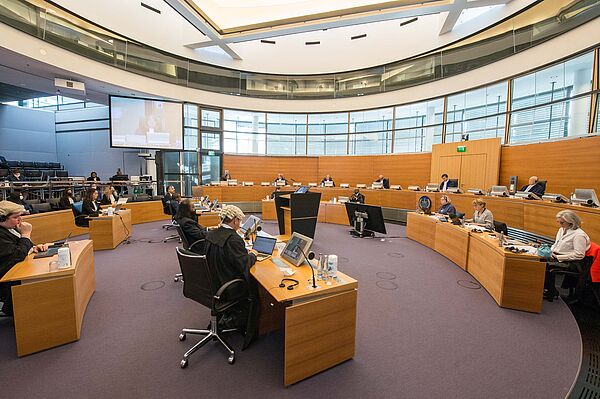
The vacancy left by the resignation of Judge Cot from the Special Chamber was filled by Judge Pawlak by the Tribunal’s Order of 15 September 2020. The composition of the Chamber is now as follows: President: Judge Jin-Hyun Paik; Members: Judges Jesus, Pawlak, Yanai, Bouguetaia, Heidar and Chadha; Judges ad hoc Oxman and Schrijver.
The public hearing in the preliminary objections phase of the case was held from 13 to 19 October 2020 in hybrid format. At the close of the oral proceedings, the Parties presented their final submissions, which may be found of the website case page together with the written pleadings, verbatim records, webcast archive of the hearing and photographs. The Special Chamber is currently deliberating on the case and expects to deliver its judgment concerning the preliminary objections of Maldives in early 2021.
Case No. 29: The M/T “San Padre Pio” (No. 2) Case (Switzerland/Nigeria)
In accordance with Order 2020/1 of 7 January 2020, the Parties are currently in the written proceedings phase of the case.
ITLOS Bench

During elections held from 24 to 26 August 2020, five new judges were elected to the Tribunal's bench by the thirtieth Meeting of States Parties to the United Nations Convention on the Law of the Sea. The States Parties re-elected Judge Attard (Malta) and Judge Kulyk (Ukraine) and elected Ms María Teresa Infante Caffi (Chile), Mr Jielong Duan (China), Ms Kathy-Ann Brown (Jamaica), Ms Ida Caracciolo (Italy) and Mr Maurice Kamga (Cameroon). At a public ceremony held on 1 October 2020, the five new judges were sworn in as members of the Tribunal to serve for a term of nine years.
With the newly-elected members, the ITLOS bench maintains its geographical distribution of seats (Africa five, Asia five, Latin America and the Caribbean four, Eastern Europe three and Western Europe and other States four), but has a new gender balance of 16 male judges and five female judges.
Interview with President Hoffmann
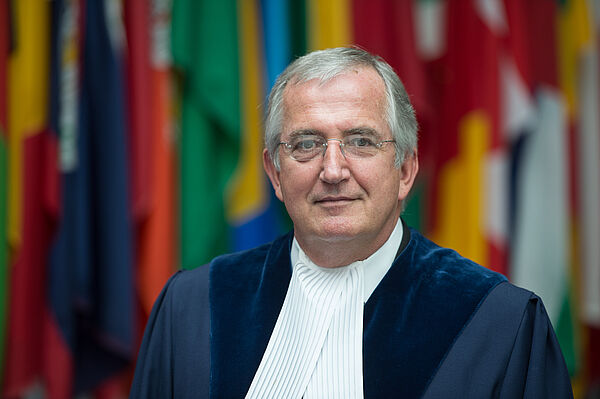
You have been on the bench since 2005, acting as vice-president of the Tribunal from 2011 to 2014 as well as president of the Seabed Disputes Chamber from 2017 to 2020. What are some of your thoughts on the development of the Tribunal since you started and where do you hope to see the Tribunal at the end of your three years now as president?
Before responding to this question, I would like to point out what a privilege it has been for me to be a part of the legacy of this judicial institution. When I first joined the Tribunal in 2005, I was the youngest member of the bench (although only for my first three years), and I am honoured to say that I have shared the bench with judges who had been at the Tribunal since its establishment. Some of these judges were involved in the Third United Nations Conference on the Law of the Sea and I am fortunate enough to have learnt from and worked alongside some of them. As with the other institutions created by the Convention, the first ten years of the Tribunal’s existence can be characterized by the “post-codification era”, where the aim was to establish the relevant practices and procedures of the Tribunal. In this time, the Tribunal mostly dealt with urgent proceedings where it exercised its compulsory jurisdiction in applications for the prompt release of vessels and their crews, and the prescription of provisional measures. The Tribunal dealt with nine prompt release cases in this time and I believe that the absence of prompt release cases in the latter part of the Tribunal’s existence is evidence that the law in this regard has largely been settled. Following this, the jurisprudence of the Tribunal has increased to include disputes concerning maritime delimitation, aspects concerning the marine environment, fisheries activities, issues relating to shipping and navigation in general, and two important advisory opinions. The Tribunal has undoubtedly established itself as an important role player in the settlement of law of the sea-related disputes, and I believe that its jurisprudence offers a sense of predictability and certainty for States. Considering the time that it often takes to dispense of international disputes, three years is not very long. However, in my time as president, I hope not only to see the Tribunal continuing on its current path of peacefully settling disputes concerning the interpretation or application of the Convention and adding to its growing jurisprudence, but also to see the Tribunal adapting to new developments and changing circumstances in the law of the sea and to respond to challenges that will assist in further clarifying and developing the law of the sea framework.
You were elected president of the Tribunal during a hybrid session last month, during which we also saw the Tribunal amending its Rules to provide for hearings and meetings by video link. What role do you think such amendments may play in the future?
The amendments referred to allow for the Tribunal or the president, as an exceptional measure, for public health, security or other compelling reasons, to hold hearings and meetings by video link. As is the case with many institutions and businesses around the world, it is essential that the Tribunal remains innovative in carrying out its mandate by effectively adapting to new challenges. I believe that the amendments facilitated the successful completion of the Tribunal’s Fiftieth Session and were already put into practice during the preliminary objections phase of Case No. 28, where there was a mix of virtual and in-person participation. The amendments, therefore, allow the Tribunal to remain proactive in carrying out its judicial and other functions. I wish, however, to emphasize that the international nature of the Tribunal’s mandate and the geographic distribution of its members necessitate that these amendments apply only on an exceptional basis for the purposes that I have indicated.
The preliminary objections phase in Case No. 28 (Mauritius/Maldives) was recently heard by a special chamber of the Tribunal. What is your view on the potential for the different fora and procedures within the UNCLOS framework (including special chambers) to respond to contemporary law of the sea issues, including sea-level rise and BBNJ?
The Convention provides a flexible framework for States to settle their disputes and special chambers are only one of a number of possibilities. Special chambers have thus far been used in Case No. 7 (Chile/European Union), Case No. 23 (Ghana/Côte d'Ivoire), and the ongoing Case No. 28 (Mauritius/Maldives). The composition and size of special chambers require the approval of the parties to the dispute, and they may also have some say over the rules of procedure adopted for a particular case. That said, the Tribunal is well positioned to make full use of all the different possibilities available to it under the Convention, its Statute and Rules. What forum is most suitable and effective will depend on the nature of the particular dispute. This is especially relevant given contemporary law of the sea developments that were not envisioned when the Convention was drafted. Such developments include sea-level rise, the ongoing negotiations regarding an international legally binding instrument under UNCLOS on the conservation and sustainable use of marine biological diversity of areas beyond national jurisdiction (“BBNJ”), as well as the active work of States Parties within the framework of the International Seabed Authority to adopt regulations for the exploitation of mineral resources in the Area. It may be too early in the BBNJ negotiations to know what kind of dispute resolution mechanism might be considered but since this would be a legally binding instrument under the Convention, the expectation is that due consideration shall be given to the existing system of compulsory dispute settlement under Part XV of the Convention and perhaps even an expanded role for the Tribunal within this system. It is also foreseeable that the Tribunal, through its Seabed Disputes Chamber, will play an enhanced role in the settlement of disputes related to the exploitation of mineral resources in the Area, either in contentious cases or through advisory opinions. I therefore believe that the Tribunal is not only well placed to respond to contemporary developments, but that the Tribunal has a crucial role to play in peacefully settling disputes that may arise as a result of such developments.
You have been the Chief State Law Advisor as well as a legal advisor to the Permanent Mission of your Government to the United Nations, and have also lectured in different graduate and post-graduate programmes. Having experience in public international law from both the academic and practical side, what words of advice would you offer other young African scholars interested in pursuing a career in the law of the sea?
As a region, Africa has the greatest number of ratifications to the Convention and there is a clear need for African scholars to continue developing expertise in what I believe to be a very dynamic and integral part of public international law. There are many opportunities for scholars interested in the law of the sea, including the internship programme and the ITLOS-Nippon capacity-building programme, organized by the Tribunal, as well as the Summer Academy of the International Foundation for the Law of the Sea. African States played a significant role in the negotiation of the Convention, including in the development of new maritime zones and law of the sea concepts. It is therefore important that young African scholars build on and give effect to the aspirations of their predecessors to ensure an equitable and efficient utilization of the ocean and its resources for the benefit of all. I see it as my responsibility and that of my colleagues to set such young lawyers and scholars up for success. The ability to work and interact with young scholars and government officials is one of the most rewarding aspects of my work at the Tribunal, and I look forward to seeing these individuals take on the baton, so to speak, and to safeguard and build on the ideals embodied in the Convention. As a final point, I would remind young African scholars to work hard, be patient, take advantage of the opportunities that present themselves and to never give up – the future is in your hands.
ITLOS Conferences and Events
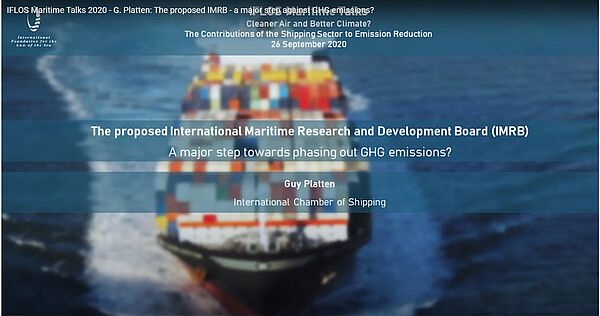
The International Foundation for the Law of the Sea held its Maritime Talks online on 26 September 2020 on the topic “Cleaner air and better climate? The contributions of the shipping sector to emission reductions”. After a welcome from President Paik, the event featured the following presentations:
- Current and prospective international efforts to reduce ship emissions, Edmund Hughes, UK Maritime and Coastguard Agency;
- A German perspective on the regulation of vessel emissions, Jörg Kaufmann, German Federal Maritime and Hydrographic Agency;
- Blind spots and asymmetry in environmental regulation at sea–clean air, clean fuels and dirty secrets, Sönke Diesener, German Nature and Biodiversity Conservation Union;
- The shipowners’ perspective on emission reductions and sustainable shipping, Jörg Erdmann, Hapag Lloyd; and
- The proposed International Maritime Research and Development Board – A major step towards phasing out GHG emissions?, Guy Platten, International Chamber of Shipping.
The presentations may be viewed at https://www.iflos.org/events/virtual-events/
Capacity Building
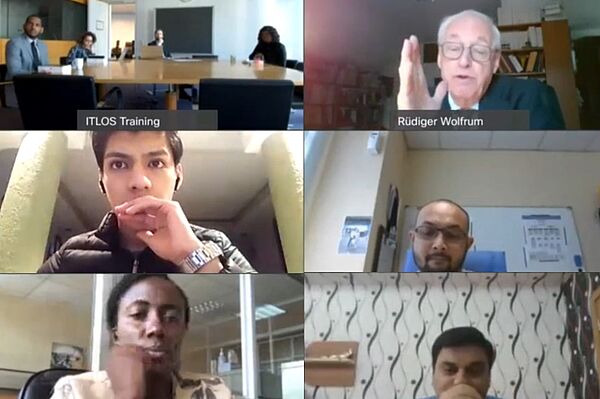
ITLOS-Nippon capacity-building and training programme on dispute settlement under UNCLOS
The programme is currently running in hybrid format with three fellows at the Tribunal and four participating remotely. The programme of lectures is running as usual but no excursions have been arranged. We are hopeful that all the fellows will be able to travel to Hamburg and undertake a selection of excursions before the end of the programme in March 2021. Switching to online lectures has provided an opportunity to welcome both regular lecturers such as Judge Wolfrum, who presented the treatment of evidence before international courts and tribunals, and Professor Alina Miron of the University of Angers, who lectured on the delimitation of the continental shelf beyond 200 nautical miles, but has additionally opened the programme to lecturers who live and teach further afield and allowed new topics to be included in the curriculum, such as Professor Natalie Klein, from UNSW Sydney's Faculty of Law, who gave a lecture on maritime peace and security, Professor Nilüfer Oral, Director of the Centre for International Law, National University of Singapore, who lectured on sea-level rise, and Dr Joanna Dingwall, Visiting Lecturer in International Law, University of Glasgow, whose lecture looked at investment law and deep seabed mining. Four distinguished lecturers will also be introducing topics of international environmental law in the coming weeks: the fellows are looking forward to lectures from Catherine Redgwell, Chichele Professor of Public International Law at Oxford University; Dr Cymie Payne, Associate Professor, School of Environmental and Biological Sciences, Rutgers University; Tamar Meshel, Assistant Professor, Faculty of Law of the University of Alberta; and Professor Ellen Hey, Full Professor Erasmus University Rotterdam, School of Law.
Internship programme
The outgoing interns, Kokougan Messiga (Togo), Aiman Ospankulova (Kazakhstan), Maïa Perraudeau (UK/France) and Louino Volcy (Haiti) presented their research on the topics “La jurisprudence du TIDM en matière de responsabilité internationale”, “La Convention des Nations Unies sur le droit de la mer et la protection des droits de l’homme”, “Brexit and the quest for ecologically-sound fishing: UK powers and obligations on withdrawal from the Common Fisheries Policy”, and “La délimitation des frontières maritimes entre Haïti et la Jamaïque: défis et perspectives’”shortly before they left the Tribunal in September. In October, four more interns joined the Tribunal: Zeynep Karacaoğlu (Turkey), Aurelia Pyneeandee (France), Johanna Romero Loayza (Peru) and Anh Vo (Viet Nam). They are currently undertaking research for their supervisors in the Legal Office and working on their own research projects.
Another example of how capacity building has adapted to the pandemic and grown as a result of the restrictions imposed by it is the current positive development of the alumni presentation series. The series was originally conceived as a zero-budget programme with a view to welcoming alumni back to the Tribunal to present their research work and to meet the current interns and fellows as and when they were passing through Hamburg. As everyday life moved online so too did the alumni presentation series. Since the summer, a growing number of alumni have welcomed the opportunity to attend presentations from: Mitchell Lennan, PhD candidate in international law of the sea at the University of Strathclyde, on “Adapting to fisheries redistribution under climate change: A role for Regional Fisheries Management Organizations?”; Catherine Blanchard, PhD candidate at Utrecht University and a member of the Netherlands Institute for the Law of the Sea, on “The elusive search for sustainable high seas fisheries: What role for an oceans governance approach?”; Eduardo Jiménez Pineda, PhD candidate and Assistant Professor of Public International Law at the University of Córdoba (Spain), on “Reflections from a procedural perspective on international arbitration in accordance with UNCLOS, in particular, the jurisdiction of arbitral tribunals under Annex VII of UNCLOS” and Carlos. A. Cruz Carrillo on “The advisory jurisdiction of the plenary of the ITLOS: Problems and opportunities”. We look forward to the upcoming alumni presentation of Hilde Woker on “The law-science interface within the law of the sea”.
Meet the ITLOS Alumni
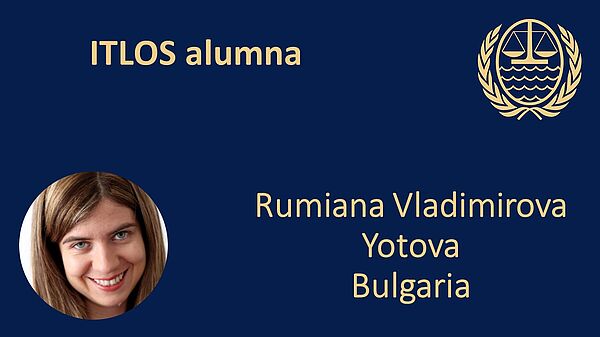
Rumiana Vladimirova Yotova (Bulgaria), ITLOS intern 2006 and IFLOS participant 2007. University lecturer in international law at the Faculty of Law, University of Cambridge and Fellow and Director of Studies in Law at Gonville & Caius College.
I did my ITLOS internship in 2006 during the final year of my Magister Juris degree at Sofia University in Bulgaria. I had just participated in the Jessup International Moot Court Competition in a team coached by Judge Professor Alexander Yankov, working on a case involving piracy and the protection of the marine environment. I was keen to deepen my knowledge and understanding of the law of the sea and Professor Yankov was a true inspiration in this respect. The internship was an invaluable opportunity to gain access to the resources in the Library of the Tribunal, as well as to discuss my project on the MOX Plant case with the legal officers and the judges, who were extremely approachable and willing to engage. I was particularly fascinated by the opportunity to discuss the United Nations Convention on the Law of the Sea with the people who had drafted it! I thoroughly enjoyed my time at ITLOS and went back the following year for the inaugural course of the IFLOS Academy, which proved as stimulating as I had hoped.
After my internship at the Tribunal, I became certain that my future lay in the field of public international law. I did another internship at the European Commission’s Directorate General for Maritime Affairs and Fisheries, experiencing the international law of the sea from the perspective of the EU, and I then proceeded with an LL.M degree in Leiden. Following this, I did my doctorate under the supervision of Professor James Crawford at the University of Cambridge where I stayed on, now as a lecturer in international law.
The law of the sea has always been my true passion in international law. It ignited my interest in the interaction between different regimes of international law and the question as to how to resolve conflicts of norms, which inspired my doctoral thesis on the public policy of international law. My current research in the nascent field of international biomedical law is also enriched by the concepts and principles of the law of the sea. I am looking at the legal status of the human genome as a common heritage of mankind, as well as the implications of international environmental law in regulating genome editing. One day, I dream of reintroducing the law of the sea as one of the taught courses at Cambridge.
Looking back to my internship in ITLOS, I can say without doubt that it marked the beginning of my career in international law and I will be forever grateful for this opportunity!
Upcoming Events
The Special Chamber expects to deliver its judgment concerning the preliminary objections of Maldives in early 2021.

